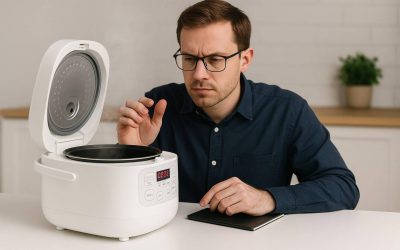As an Amazon Associate I earn from qualifying purchases.
A restaurant commercial rice cooker is a crucial tool for any food service business, helping to produce large quantities of perfectly cooked rice for daily operations. However, if your rice cooker begins to emit unusual odors, it could indicate underlying issues that need immediate attention. At Expert Reviews Best Rice Cooker, we recognize the importance of maintaining a clean and efficient kitchen environment. Ensuring your rice cooker operates without unwanted smells is key to delivering quality food and maintaining hygiene standards. If you’re looking for the best commercial rice cooker for your business, it’s important to choose one that is not only durable but also easy to maintain.
For a comprehensive guide on selecting the best rice cooker for your restaurant, Continue reading to explore the top models and features that can elevate your kitchen’s efficiency.
Common Causes of Unusual Odors in a Restaurant Commercial Rice Cooker
If your restaurant commercial rice cooker is emitting strange or unpleasant smells, it’s likely due to a combination of improper cleaning, buildup of food residue, or faulty components. Below are the most common causes and solutions to help you address these issues.
1. Food Residue and Buildup
One of the most frequent causes of unusual odors in a restaurant commercial rice cooker is the buildup of food residue. Starch from rice, water deposits, and oil from other ingredients can accumulate over time, especially in hard-to-reach places such as the lid, vents, or around the inner pot.
Solution: Regular cleaning is the best way to prevent this issue. After every use, clean the inner pot thoroughly with warm water and mild detergent. Be sure to also wipe down the lid, outer surface, and steam vent to remove any trapped particles. For stubborn stains or residues, use a non-abrasive sponge or cloth to avoid damaging the cooker’s surface.
2. Mold or Mildew Growth
Leaving your rice cooker sealed for long periods, especially in humid environments, can lead to mold or mildew growth. This is a common issue in busy restaurant kitchens where rice cookers are sometimes left closed with leftover rice inside for extended periods.
Solution: Always empty and clean your restaurant commercial rice cooker immediately after use. Ensure that the cooker is completely dry before closing the lid to prevent moisture buildup. Additionally, leave the lid open when the cooker is not in use to allow air circulation, which helps prevent mold and mildew from developing.
3. Poor Ventilation and Steam Buildup
Improper ventilation during cooking can trap steam and odors inside the rice cooker. Over time, the accumulation of moisture and cooking residues in the steam vent can lead to unpleasant smells, especially if the vent is clogged or blocked.
Solution: Regularly inspect and clean the steam vent to ensure it’s not clogged. Use a soft brush or cloth to gently clean the vent and allow air to flow freely. Ensure that your cooker is positioned in a well-ventilated area to avoid trapping odors during cooking.
4. Burnt Rice or Food at the Bottom of the Cooker
Another cause of unusual odors is burnt rice or food stuck to the bottom of the inner pot. This happens when rice is left cooking for too long, or the cooker is set to the wrong temperature, causing the rice to overcook and burn.
Solution: To avoid this, carefully monitor cooking times and use the correct settings based on the type of rice or food you’re cooking. Clean the bottom of the pot thoroughly after every use to remove any burnt residue. If burnt food persists, consider replacing the inner pot or adjusting the cooking temperature.
5. Old or Worn-Out Gaskets and Seals
The gasket or seal in your restaurant commercial rice cooker plays a vital role in maintaining the cooker’s internal pressure and preventing steam from escaping. Over time, gaskets can wear out, trap food particles, or develop odors if they’re not cleaned regularly.
Solution: Inspect the gasket for signs of wear, cracks, or food buildup. If you notice any damage, replace the gasket immediately to maintain the cooker’s performance and eliminate odors. Clean the gasket thoroughly after each use to prevent the buildup of food particles or moisture.
6. Electrical Malfunctions or Overheating
Sometimes, unusual odors can result from electrical issues or overheating. If your restaurant commercial rice cooker is malfunctioning, it may emit a burnt or metallic smell. This could be due to faulty wiring, a damaged heating element, or an overworked power cord.
Solution: If you suspect electrical issues, stop using the rice cooker immediately and have it inspected by a professional technician. Ensure the cooker is plugged into the correct voltage outlet and that the power cord is not damaged or worn. For overheating issues, ensure proper ventilation and avoid overloading the cooker.
Preventive Maintenance for Avoiding Odors in Your Commercial Rice Cooker
Preventing unpleasant odors in your restaurant commercial rice cooker requires routine maintenance and cleaning. Here are some preventive measures to help keep your rice cooker fresh and odor-free:
1. Establish a Cleaning Routine
A consistent cleaning schedule is the most effective way to prevent odors. After each use, clean the inner pot, lid, and all removable parts. Use warm water and mild detergent to wash away food residues, and be sure to dry everything thoroughly before reassembling the cooker.
Tip: For deep cleaning, you can occasionally run the cooker with a mixture of water and a few tablespoons of white vinegar. This helps remove any lingering odors and disinfects the pot and vents.
2. Store the Cooker Properly
When the cooker is not in use, store it with the lid slightly open to allow air circulation. This prevents the buildup of moisture inside the cooker, which can cause mold and mildew. Avoid storing the cooker in damp or humid areas, as this can contribute to the growth of bacteria and unwanted smells.
3. Replace Parts When Necessary
Regularly inspect your cooker’s components, such as the gasket, steam vent, and power cord. If any parts appear worn or damaged, replace them immediately to prevent odors and maintain optimal performance. Using manufacturer-approved replacement parts ensures that your rice cooker continues to function properly.
4. Avoid Overfilling the Cooker
Overfilling your restaurant commercial rice cooker can cause rice to boil over, leading to spills and burnt food inside the cooker. Follow the manufacturer’s guidelines regarding the maximum capacity to avoid overflows and burnt residues that contribute to odors.
5. Use the Correct Cooking Settings
Different types of rice require different settings, and using the wrong setting can result in overcooked or burnt rice, which often leads to unpleasant smells. Always use the correct setting based on the type of rice you’re cooking (e.g., white rice, brown rice, or sushi rice) and monitor the cooking process closely to prevent burning.
Frequently Asked Questions (FAQ’s)
Q: What are the common causes of unusual odors in a restaurant commercial rice cooker?
A: The most common causes include:
Food residue buildup: Leftover starch, rice particles, and water deposits can accumulate in the inner pot and steam vent, creating bad odors over time.
Mold or mildew: If moisture is trapped inside the cooker due to improper cleaning or storage, mold or mildew can develop, leading to foul smells.
Burnt rice or food: Overcooking or leaving rice in the cooker for too long can result in burnt food, which emits a burnt smell.
Worn-out gaskets: A degraded or dirty gasket can trap food particles, creating odors.
Electrical malfunctions: Faulty wiring or overheating can cause a metallic or burnt smell.
Q: How does food residue buildup in a commercial rice cooker lead to unpleasant odors?
A: Food residue, especially rice starch, can stick to the inner pot, the lid, or the steam vent over time. If these areas are not cleaned thoroughly after each use, the residue will decompose and create bad odors. Moist environments inside the rice cooker can accelerate this process, leading to persistent unpleasant smells.
Q: What is the best way to clean a restaurant commercial rice cooker to avoid unusual odors?
A: The best cleaning practices include:
Cleaning the inner pot after each use with warm water and mild detergent, making sure to remove all food particles.
Cleaning the lid, steam vent, and surrounding areas to remove trapped moisture and food residue.
For deep cleaning, running a cycle with a mixture of water and vinegar can help eliminate lingering odors and disinfect the cooker.
Always dry all parts thoroughly before reassembling the cooker to prevent moisture buildup.
Q: Why does mold or mildew develop in a commercial rice cooker, and how can I prevent it?
A: Mold or mildew can develop if the rice cooker is stored with the lid closed while still damp or if leftover rice is left inside for too long. The dark, moist environment inside the cooker provides ideal conditions for mold growth.
Prevention Tips:
Always clean and dry the rice cooker immediately after use.
Leave the lid slightly open when the cooker is not in use to allow air circulation.
Store the cooker in a dry, well-ventilated area.
Q: How does burnt rice or food contribute to unusual odors in a commercial rice cooker?
A: Burnt rice or food happens when rice is left cooking for too long or the cooker’s settings are incorrect. The charred food at the bottom of the pot emits a burnt smell, which can linger even after the cooker is cleaned.
Solution: Monitor cooking times closely, and clean the inner pot immediately if rice or food sticks to the bottom. Regular cleaning will help prevent odors from becoming a recurring issue.
Q: How can a worn-out gasket cause odors in a commercial rice cooker?
A: The gasket (seal) in a rice cooker is designed to maintain internal pressure and prevent steam from escaping. Over time, gaskets can collect food particles or moisture, which can create bad smells if not cleaned properly. A worn-out or cracked gasket may also fail to seal properly, causing odors to escape during cooking.
Solution: Inspect the gasket regularly and clean it after each use. Replace it when it shows signs of wear or damage.
Q: Can electrical issues cause unusual odors in a restaurant commercial rice cooker?
A: Yes, electrical problems such as faulty wiring, overheating, or a malfunctioning heating element can cause burnt or metallic odors. If these smells persist, they may indicate an underlying issue with the cooker’s electrical system, which should be addressed immediately.
Solution: Unplug the cooker and consult a professional technician to inspect the wiring and internal components. Never attempt to repair electrical issues yourself unless you are trained to do so.
Q: How can I prevent unusual odors from forming in my restaurant commercial rice cooker?
A: Prevent odors by:
Establishing a regular cleaning routine for all parts of the rice cooker.
Storing the cooker with the lid slightly open to allow air circulation.
Avoiding overfilling the cooker to prevent spills and burnt rice.
Using the correct cooking settings for the type of rice being prepared.
Regularly replacing worn-out components such as the gasket and checking for electrical faults.
Q: What should I do if my rice cooker continues to produce unusual odors despite cleaning?
A: If unusual odors persist even after thorough cleaning, it could be due to damaged components, such as the gasket or heating element, or hidden mold or mildew in the vent or internal parts. You should:
Inspect the cooker for hidden residue or damage.
Replace worn-out parts, like the gasket or inner pot.
If the problem persists, consult a technician to inspect for deeper electrical or mechanical issues.
Q: How often should I deep clean my restaurant commercial rice cooker to avoid odors?
A: Deep cleaning should be done once every week or every few uses, depending on how frequently the cooker is used. For daily use in a commercial setting, it’s a good idea to deep clean at least once a week using a mixture of water and vinegar to disinfect and eliminate any lingering odors.
Conclusion
Unusual odors in your restaurant commercial rice cooker can be a sign of several potential issues, from food residue and moisture buildup to faulty components. By identifying the common causes and implementing the solutions outlined in this guide, you can keep your rice cooker operating smoothly and odor-free. Regular cleaning, proper maintenance, and timely replacement of worn parts will go a long way in ensuring the longevity of your rice cooker.
For more expert tips and advice on choosing the best commercial rice cooker for your restaurant, be sure to visit Expert Reviews Best Rice Cooker. We offer comprehensive reviews and buying guides to help you find the right rice cooker for your business’s needs.






